Posts Tagged ‘Marketing/Category Design’
081 Marketing Fail: Sherwin-Williams Vs. Ocean Spray
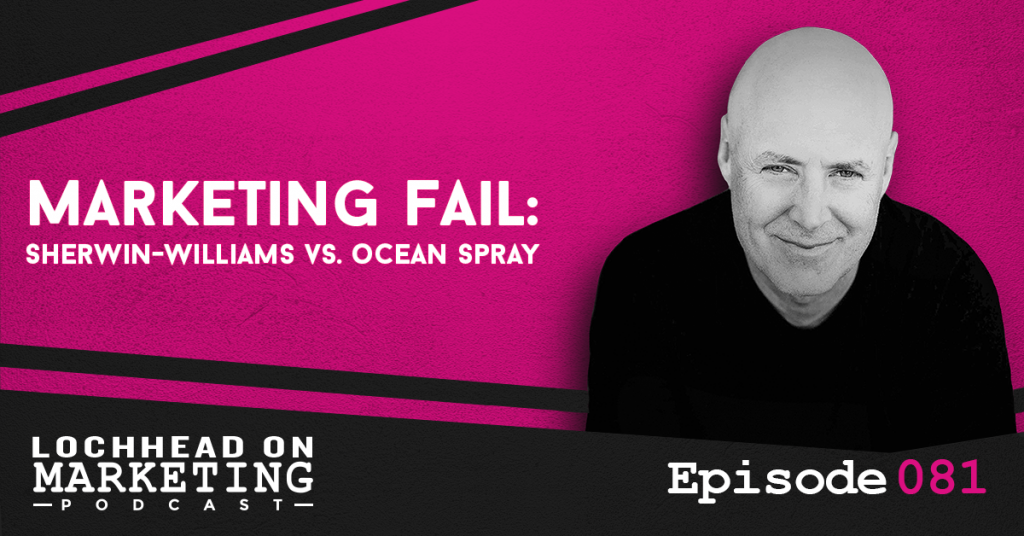
Podcast (lochheadonmarketing): Play in new window | Download (Duration: 9:29 — 6.5MB) | Embed
Subscribe: Apple Podcasts | Spotify | RSS | More
In today’s episode, we dig into two how two companies approached a viral situation. First, Ocean Spray’s positive trendjack in response to Nathan Apodaca’s viral TikTok video. Second, is how Sherwin-Williams fired an employee who created viral Tiktok videos mixing paints. We ask the seminal question, how can you be more like Ocean Spray?
Marketing Wins and Fails
When Nathan Apodaca’s Tik Tok video went viral (he was skateboarding, drinking his Ocean Spray, singing Fleetwood Mac’s “Dreams”), newly appointed Ocean Spray CEO, Tom Hayes took action. It was the trendjack of the year and Tom Hayes took it to a whole new level. It ultimately gave Ocean Spray positive PR.
Now, on the other hand, when Tony Piloseno, an Ohio University senior, who worked part-time at Sherwin Williams created a set of popular paint videos on TikTok, he got fired. What’s worse: Piloseno said he actually pitched Sherwin Williams Corporate Marketing Team the idea of being more active on TikTok with some of his videos.
“Piloseno says it took TWO MONTHS to get in touch with corporate marketing and they ‘basically told me that there wasn’t really any promotions going onso there wasn’t a need to see the presentation.’ %$#@!!!!” – Christopher Lochhead
What Savvy CEOs and CMOs Do
Do you work for a company like Ocean Spray or Sherwin Williams? If you want to be more like Ocean Spray, how do we do that? Most companies today, if they are smart, they have social media marketing departments trying to create what this guy has created.
“Savvy CEOs and CMOs invest heavily in creating legendary digital content. leaders want to share knowledge, they have a point of view, and as a result, they are mobilizing communities, they are creating movements and ultimately, they are growing their category and brands through a thought leadership owned media and earned media strategy.” – Christopher Lochhead
Seminal Questions To Ask
Christopher narrates one of his conversations with Robert Rosenberg, the former CEO of Dunkin Donuts. He and his team capitalized on one franchisee discovering a potential product, the munchkins and that is a great example providing support to your team.
“This brings us three seminal questions for all of us Marketers, number 1, are you building an Ocean Spray or Sherwin Williams-like culture? Number 2, are you encouraging radical creativity amongst your people and number? Number 3, are you building a digital owned media strategy and capability?” – Christopher Lochhead
To know more about marketing fail: Sherwin-Williams Vs. Ocean Spray story, download and listen to this episode.
Bio:
Christopher Lochhead is a #1 Apple podcaster and #1 Amazon bestselling co-author of books: Niche Down and Play Bigger.
He has been an advisor to over 50 venture-backed startups; a former three-time Silicon Valley public company CMO and an entrepreneur.
Furthermore, he has been called “one of the best minds in marketing” by The Marketing Journal, a “Human Exclamation Point” by Fast Company, a “quasar” by NBA legend Bill Walton and “off-putting to some” by The Economist.
In addition, he served as a chief marketing officer of software juggernaut Mercury Interactive. Hewlett-Packard acquired the company in 2006, for $4.5 billion.
He also co-founded the marketing consulting firm LOCHHEAD; was the founding CMO of Internet consulting firm Scient, and served as head of marketing at the CRM software firm Vantive.
We hope you enjoyed this episode of Lochhead on Marketing™! Christopher loves hearing from his listeners. Feel free to email him, connect on Facebook, Twitter, Instagram, and subscribe on Apple Podcast! You may also subscribe to his newsletter, The Difference, for some amazing content.
062 How to be a Category Designer | Marketing PodStorm 24
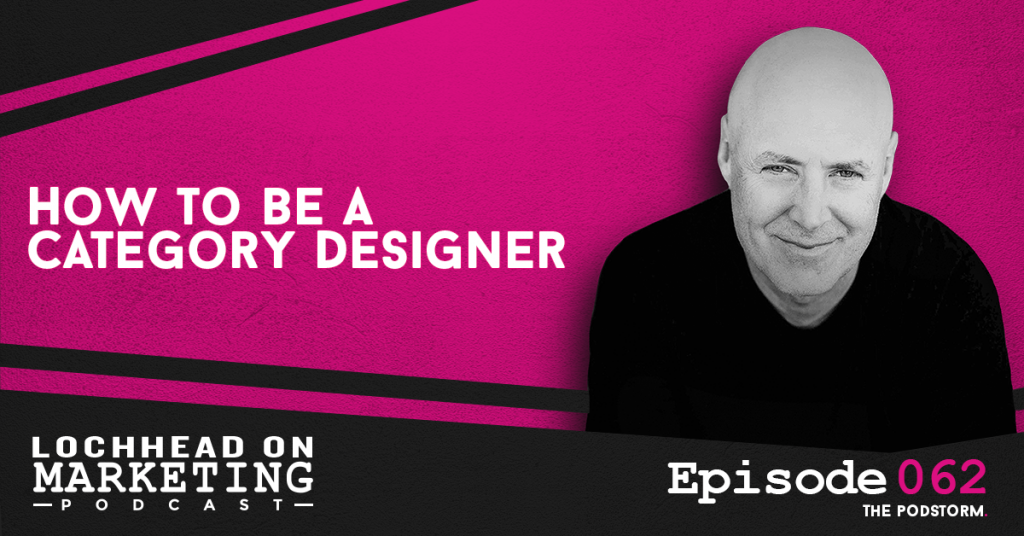
Podcast (lochheadonmarketing): Play in new window | Download (Duration: 16:21 — 11.2MB) | Embed
Subscribe: Apple Podcasts | Spotify | RSS | More
In this episode, an incredibly important topic, we discuss how to be a category designer. Moreover, we dig into how to become the person that drives a new strategy for your company and introduces the world to something new, something different, something that makes a giant difference.
Category Design: A Discipline
Christopher narrates a portion of the book Play Bigger which states: “Category design is the discipline of creating and developing a new market category and conditioning the market so it will demand your solution and crown your company as its King.”
“A category designer leads a company-wide strategy with the goal of becoming a category Queen of high value, high growth market category of your choosing.” – Christopher Lochhead
In the same book, Christopher and his co-authors did research and found out that in the tech space, one company takes two-thirds of the economics. As more and more companies behave like tech companies, more and more companies are taking two-thirds of the market.
Category Design: All-Encompassing
Category design is a discipline and for many a career. Christopher has mastered this discipline and has become a huge differentiator for his career as a 3x CMO and as an advisor.
“A category designer brings together all the critical functions in a business — the key strategic activities across your company, aligning sales, marketing, product development/engineering, and even HR — with the single focus of becoming a category queen.” – Christopher Lochhead
Category Design: The Drivers of Change
Category design is a collaborative effort between the CEO and all other Chief Officers of the company. Christopher digs deep into the process and how to go about designing your category.
“Now, category designers bring together the whole business. They help create a blueprint, a visual representation that generates a belief that you have a solution to an urgent problem. So they build this blueprint. They are the creators, and at least co-authors, if not primary authors of the provocative and engaging POV point of view that you’re now going to evangelize.” – Christopher Lochhead
To know more about becoming a category designer, download and listen to this episode.
Bio:
Christopher Lochhead is a #1 Apple podcaster and #1 Amazon bestselling co-author of books: Niche Down and Play Bigger.
He has been an advisor to over 50 venture-backed startups; a former three-time Silicon Valley public company CMO and an entrepreneur.
Furthermore, he has been called “one of the best minds in marketing” by The Marketing Journal, a “Human Exclamation Point” by Fast Company, a “quasar” by NBA legend Bill Walton and “off-putting to some” by The Economist.
In addition, he served as a chief marketing officer of software juggernaut Mercury Interactive. Hewlett-Packard acquired the company in 2006, for $4.5 billion.
He also co-founded the marketing consulting firm LOCHHEAD; was the founding CMO of Internet consulting firm Scient, and served as head of marketing at the CRM software firm Vantive.
We hope you enjoyed this episode of Lochhead on Marketing™! Christopher loves hearing from his listeners. Feel free to email him, connect on Facebook, Twitter, Instagram, and subscribe on iTunes! You may also subscribe to his newsletter, The Difference, for some amazing content.
061 Market Categories Are Not Like The Weather | Marketing PodStorm 23
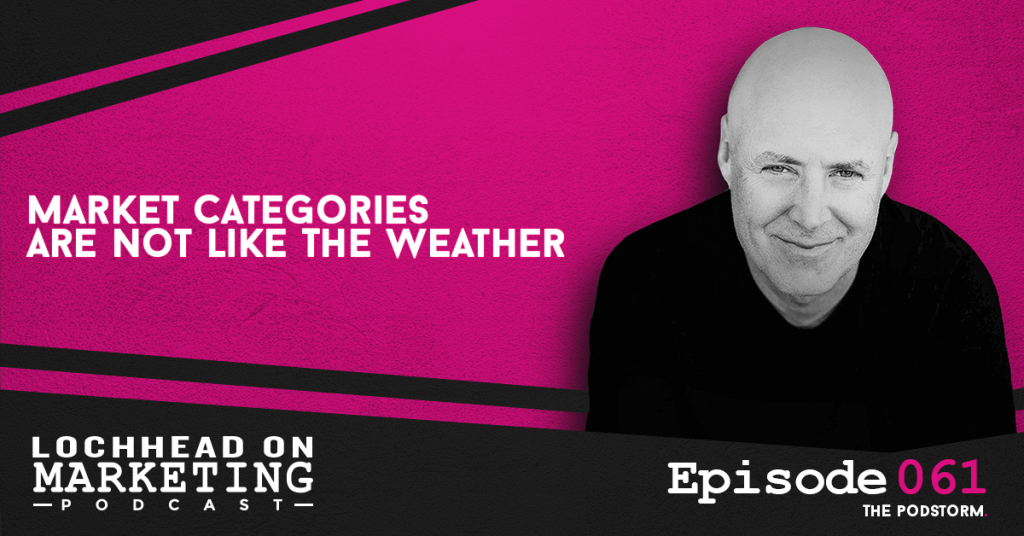
Podcast (lochheadonmarketing): Play in new window | Download (Duration: 11:44 — 8.1MB) | Embed
Subscribe: Apple Podcasts | Spotify | RSS | More
Have you ever noticed how people talk about market categories? People involved with the business perpetuate one of the biggest lies in business. As published in a lot of major publications, these “business writers” say market categories are like the weather, we cannot control it.
Today, we will dig into why Christopher thinks its a lie standing in plain sight. We’re going to talk about how we can actually design market categories and not be the victim of them.
This Kind of Paradigm
Christopher cites several examples stating that market categories are not like the weather.
Here’s a WSJ story about IBM from Oct 2019: “IBM’s overall revenue still slipped by 4% to $18.03 billion in the quarter, coming in below Wall Street’s estimates and led mainly by the slowdown in global technology services.”
“You and I can’t do shit about the weather but we can, in this case, the global technology services market category.” – Christopher Lochhead
Here is Why it’s Bullshit
There was zero demand for bubble gum until Walter Diemer created both the product and the category in 1928. Today, bubble gum is a $28.9 Billion category.
Another example is the e-sports category. Statista.com cites “in 2018, the global eSports market was nearly 865 million U.S. dollars and will reach 1.79 billion U.S. dollars in 2022. Andy Stout suggests that 106 million people viewed the 2017 Worlds Esports competition eSports scholarships grew an astonishing 480% in 2018. The final prize pool for 2016 League of Legends World Championship, was $6.7 million.
Before Marc Benioff, founder of Salesforce, there was no cloud. In 2019 it was a $266.0 billion category and it’s growing at 15%. Market categories are not the weather. Every category exists because someone designed it.
What’s The Point
Christopher could give you a million examples. We are living in a cocoon time and somebody is designing or redesigning the future of your market category. The question for you is, is it you?
“Our businesses are not victims, we are not victims of the market. We have the ability to affect how the market categories behave. Legends, by definition, do not accept the way it is.” – Christopher Lochhead
To know more about why market categories are not like the weather, download and listen to this episode.
Bio:
Christopher Lochhead is a #1 Apple podcaster and #1 Amazon bestselling co-author of books: Niche Down and Play Bigger.
He has been an advisor to over 50 venture-backed startups; a former three-time Silicon Valley public company CMO and an entrepreneur.
Furthermore, he has been called “one of the best minds in marketing” by The Marketing Journal, a “Human Exclamation Point” by Fast Company, a “quasar” by NBA legend Bill Walton and “off-putting to some” by The Economist.
In addition, he served as a chief marketing officer of software juggernaut Mercury Interactive. Hewlett-Packard acquired the company in 2006, for $4.5 billion.
He also co-founded the marketing consulting firm LOCHHEAD; was the founding CMO of Internet consulting firm Scient, and served as head of marketing at the CRM software firm Vantive.
We hope you enjoyed this episode of Lochhead on Marketing™! Christopher loves hearing from his listeners. Feel free to email him, connect on Facebook, Twitter, Instagram, and subscribe on iTunes! You may also subscribe to his newsletter, The Difference, for some amazing content.
053 Little Marketing Ideas, Legendary Results | Marketing PodStorm 15
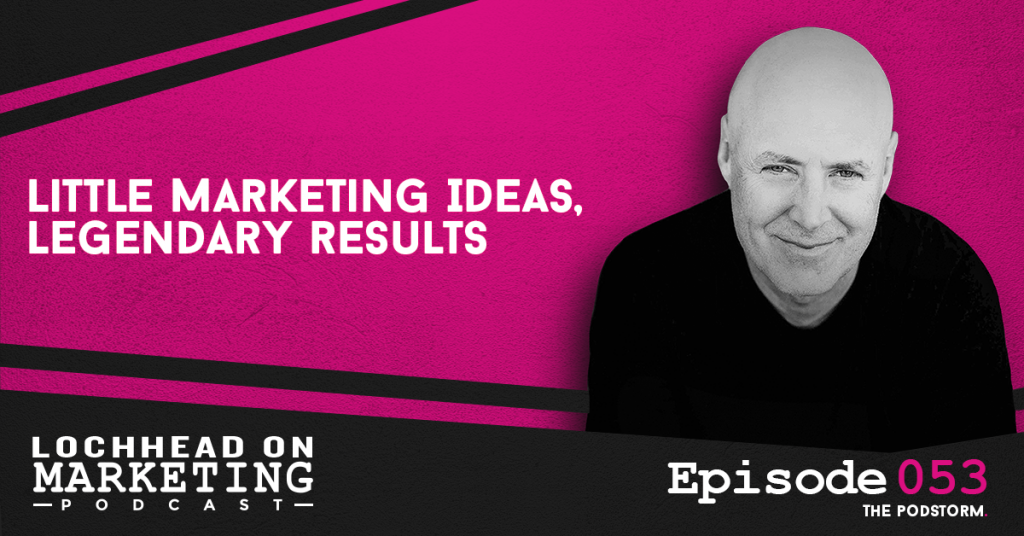
Podcast (lochheadonmarketing): Play in new window | Download (Duration: 9:38 — 6.6MB) | Embed
Subscribe: Apple Podcasts | Spotify | RSS | More
In this episode of the PodStorm, let’s talk about some little marketing ideas that can produce legendary results. Christopher shares two stories to depict this: the first, about how legendary guitar brand Fender got 500,000 emails almost overnight during the pandemic, and how Colgate got kids to brush their teeth with ice cream.
Fender Got 500,000 Emails During C19
Christopher narrates stories from his friend and copywriter Cole Shaefer of Honeycopy.com about Fender, a legendary guitar company that makes guitars and amps and other various musical equipment. Recently, they proved that radical generosity and thoughtfully aggressive can produce legendary results.
“You need to manufacture guitar players because there ain’t no guitar-buying if there ain’t no guitar players. So what Fender has done over time is they transform themselves from a hardware company into a software company. In doing so, they built their own data flywheel.” – Christopher Lochhead
The hardware company set up a software platform called Fender Play, designed to teach people to play guitar. Listen to the episode to find out what else happened when Fender decided to give access to its software, for free.
Don’t Forget About Colgate
Another story Cole Schaffer told Christopher happened way back in 2009. Colgate was devising of marketing efforts to get kinds onboard with the whole “brush your teeth twice a day” movement.
“Imagine you’re the CEO or the CMO of Colgate, and you’re trying to get kids to brush their teeth. What’s the opposite of what most people would do? Well, give them ice cream, but that’s exactly what Colgate did. So imagine instead of a generic stick inside, it’s a stick that looks a lot like a toothbrush. It’s in the shape of a toothbrush. It’s a wooden Ice cream stick in the shape of a toothbrush with a copy on it that says, ‘Don’t forget’, and Colgate started handing out Ice cream, ice cream bars to kids.” – Christopher Lochhead
Key Takeaway
These are both legendary examples of simple ideas that are very thoughtfully aggressive and radically generous at the same time. So how might that apply to your business?
“Think small, think simple, think cheap, sometimes not having much of a budget drives creativity. And ask yourself what is an insanely simple, cheap, thoughtfully aggressive, radically generous idea that we could pull off fast and then go do that?” – Christopher Lochhead
To hear more about how to devise little marketing ideas with legendary results, download and listen to this episode.
Bio:
Christopher Lochhead is a #1 Apple podcaster and #1 Amazon bestselling co-author of books: Niche Down and Play Bigger.
He has been an advisor to over 50 venture-backed startups; a former three-time Silicon Valley public company CMO and an entrepreneur.
Furthermore, he has been called “one of the best minds in marketing” by The Marketing Journal, a “Human Exclamation Point” by Fast Company, a “quasar” by NBA legend Bill Walton and “off-putting to some” by The Economist.
In addition, he served as a chief marketing officer of software juggernaut Mercury Interactive. Hewlett-Packard acquired the company in 2006, for $4.5 billion.
He also co-founded the marketing consulting firm LOCHHEAD; was the founding CMO of Internet consulting firm Scient, and served as head of marketing at the CRM software firm Vantive.
Links:
Fender wants to teach you guitar (for free) during quarantine
How Colgate reminded kids to brush their teeth by feeding them ice cream
024 The Difference Between a First Mover and a Category Creator w/ Eddie Yoon
We hope you enjoyed this episode of Lochhead on Marketing™! Christopher loves hearing from his listeners. Feel free to email him, connect on Facebook, Twitter, Instagram and subscribe on iTunes! You may also subscribe to his newsletter, The Difference, for some amazing content.
052 Questions and Cocktails: FB Live Q & A (Part 4) | Marketing PodStorm 14
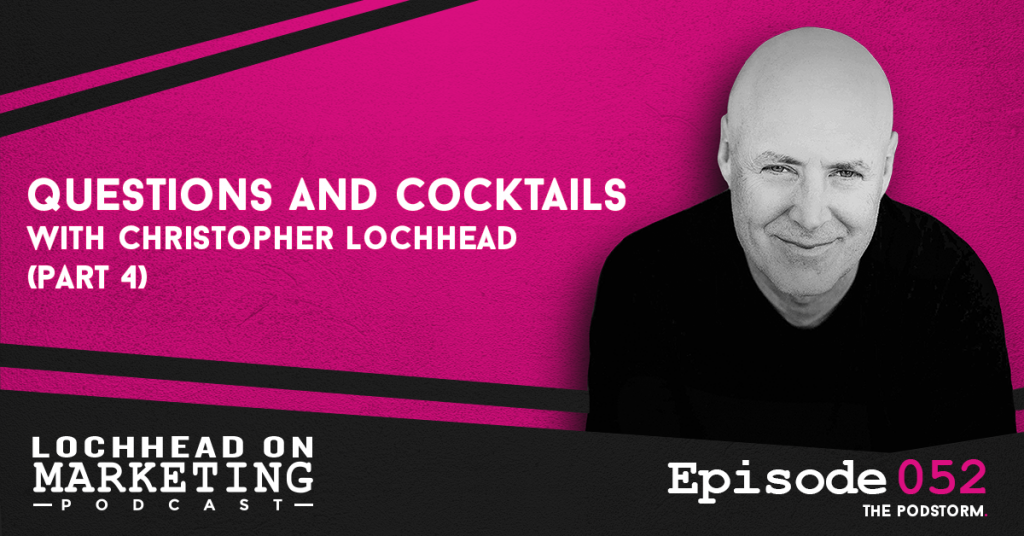
Podcast (lochheadonmarketing): Play in new window | Download (Duration: 18:35 — 12.8MB) | Embed
Subscribe: Apple Podcasts | Spotify | RSS | More
During the PodStorm, we’re doing a live Facebook Question and Answer session, every Friday, 11:30 a.m. PST. We did our first and second one last week. We’re going to share with you our fourth part of the Q&A session in this episode. Today, podcast living legend Jason DeFillippo of Grumpy Old Geeks joins us to answer some questions about lightning strikes, taglines, how to launch a new category, and much more.
How long does a Lightning Strike Last?
Christopher answers this question about marketing lightning strikes: it ranges from a day to a week. He further says that this is a challenge of either rising above the noise or being part of the noise. During a lightning strike, you try to stand out and become undeniable to your target audience
“The key tenants of a lightning strike are maximum impact in minimum time. It’s predicated on the premise that you can’t peanut butter, your marketing, right.” – Christopher Lochhead
How do we come up with a tagline?
Christopher and Jason converses nicely about coming up with a powerful tagline. Christopher says the Grumpy Old Geeks have one of the best taglines in over the web: “What went wrong on the internet and who’s to blame?” Christopher gives out other examples in this episode.
“The vast majority of taglines are complete bullshit. The reason they’re bullshit is: they’re some meaningless thing. Most importantly, they do not tie often to the brand. Category and legendary taglines are representative of a point of view, centered around the category.” – Christopher Lochhead
When is a good time to launch a new category?
Christopher gives out a few examples of companies that successfully launched their categories, such as Zoom. Jason chides in with a few more examples such as Reddit. Ultimately, what is worthy to take note are the megatrends that you could take advantage of to build a new category.
“I think it would be silly not to acknowledge the importance of timing, and to some degree, the importance of luck.” – Christopher Lochhead
To hear more about the Facebook Live Q&A with Christopher Lochhead, with Jason DeFillippo, download and listen to this episode.
Bio:
Christopher Lochhead is a #1 Apple podcaster and #1 Amazon bestselling co-author of books: Niche Down and Play Bigger.
He has been an advisor to over 50 venture-backed startups; a former three-time Silicon Valley public company CMO and an entrepreneur.
Furthermore, he has been called “one of the best minds in marketing” by The Marketing Journal, a “Human Exclamation Point” by Fast Company, a “quasar” by NBA legend Bill Walton and “off-putting to some” by The Economist.
In addition, he served as a chief marketing officer of software juggernaut Mercury Interactive. Hewlett-Packard acquired the company in 2006, for $4.5 billion.
He also co-founded the marketing consulting firm LOCHHEAD; was the founding CMO of Internet consulting firm Scient, and served as head of marketing at the CRM software firm Vantive.
We hope you enjoyed this episode of Lochhead on Marketing™! Christopher loves hearing from his listeners. Feel free to email him, connect on Facebook, Twitter, Instagram and subscribe on iTunes! You may also subscribe to his newsletter, The Difference, for some amazing content.
048 How to Market with a Powerful Point of View | Marketing PodStorm #10
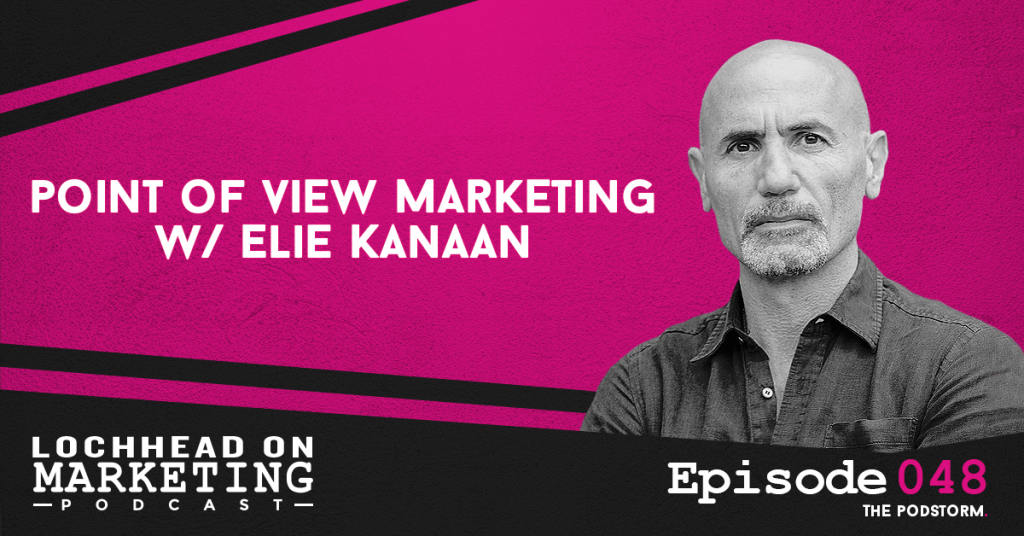
Podcast (lochheadonmarketing): Play in new window | Download (Duration: 31:53 — 21.9MB) | Embed
Subscribe: Apple Podcasts | Spotify | RSS | More
In today’s PodStorm episode, let’s go deep on how to market with a powerful point of view. POVs can be viewed as a mechanism for distinguishing your brand and most importantly, to design and dominate your market category. As wacky as it might sound, downturns can be very powerful times to do exactly that.
To discuss this in more detail, we invited Elie Kanaan. He is one of the most talented CMOS and category designers, who now works as the Head of Marketing for Ogury Europe.
One Big Challenge
Eli believes marketing a provocative POV is one of the biggest challenges any leader faces. Aside from marketing a POV, you must also know how to turn that POV into results. He says that a powerful POV starts with the CEO and CMOs should be fully supportive of it.
“I believe there are three different journeys that need to happen within the company that is led by the standard CEO, CMO. First, there’s a product transformation journey. Then, there’s a marketing transformation journey and there is a sales transformation journey. So for that, the CEO and the CMO needs to get on board, the Chief Product Officer, the Chief Technology Officer, and the Chief Revenue Officer. So those would be secondary, but equally important when it comes to execution.” – Elie Kanaan
Bringing Everyone Onboard
In presenting a POV, you need to do remember that everyone must believe and understand, your idea with bring good money to the company. Once this is defined, everybody on the board sees the light aka your powerful POV.
Aside from this, a POV becomes a strategy for the whole company and not some mere marketing message or tactic that you employ for a limited time period. A POV is a fixed lens where a company looks into a problem.
“When we declare a point of view, and we’re evangelizing a problem, that’s something that doesn’t really change. That’s it. That’s a vision, right? This distinction between a point of view that really points to a true north North, ‘what’s the mission’ or on ‘what’s the problem we’re solving?’ ‘Why should customers care’ ‘Why is this thing a new opportunity’ ‘Why is this thing, a new way of thinking about something that’s gonna make a difference for customers?’ As opposed to a message called, ‘hey, this month only buy one, get one free, right?’ That’s a message.” – Christopher Lochhead
Different Is Non-Negotiable
The next thing to do is: you have to convince everyone that your idea is different. Unique is different and hard to copy, but oftentimes, leaders confuse being different to what Eli and Christopher call as a “better drop.”
“Our minds have been molded into having a better conversation all the time because of alI the shitty marketing that happened before. I mean, there’s some good marketing that happened, but a lot of the marketing is better. This is one of the biggest pitfalls in creating the category — either on the marketing side or the product or the sales side. The Product Team wants to do better products, the Sales want to sell better features, Marketing have better value propositions. /you know, we always set it together actually, is that better is negotiable. Different isn’t.” – Elie Kanaan
To learn more about how to market a powerful and provocative point of view, download and listen to this episode.
Bio:
Elie, is an engineering mind coupled with a passion for human psychology. His life, career and interests have been a direct consequence of these two attributes.
After graduating from Stanford University with a Master in Computer Sciences, he started his career as a developer at Oracle, when Oracle was a small company.
Quickly he realized that his calling was in creating and building market categories, mostly with category kings: Client/Server Database (Oracle/Sybase), Business Technology Optimisation (Mercury), Business Intelligence (Business Objects), Enterprise Resource Planning (SAP), and Virtualization (VMware).
Elie is now working as a CMO for Ogury, helping them design their category and dominate it.
On a more personal level, Elie was born in Ivory Coast in Africa, grew up in Lebanon, studied and worked in California, married with an Ukrainian woman, lived in Belgium, and now living in Paris, with the loves of his life, his wife Vlada and their three sons, Ezekiel, Eyal, and Eliya.
Elie is a philosopher at heart. He has a deep and meaningful quote or story for every situation drawn from his multi-cultural background and household.
Links:
We hope you enjoyed this episode of Lochhead on Marketing™! Christopher loves hearing from his listeners. Feel free to email him, connect on Facebook, Twitter, Instagram, and subscribe on iTunes! You may also subscribe to his newsletter, The Difference, for some amazing content
047 We’re in a cocoon | Marketing PodStorm #9
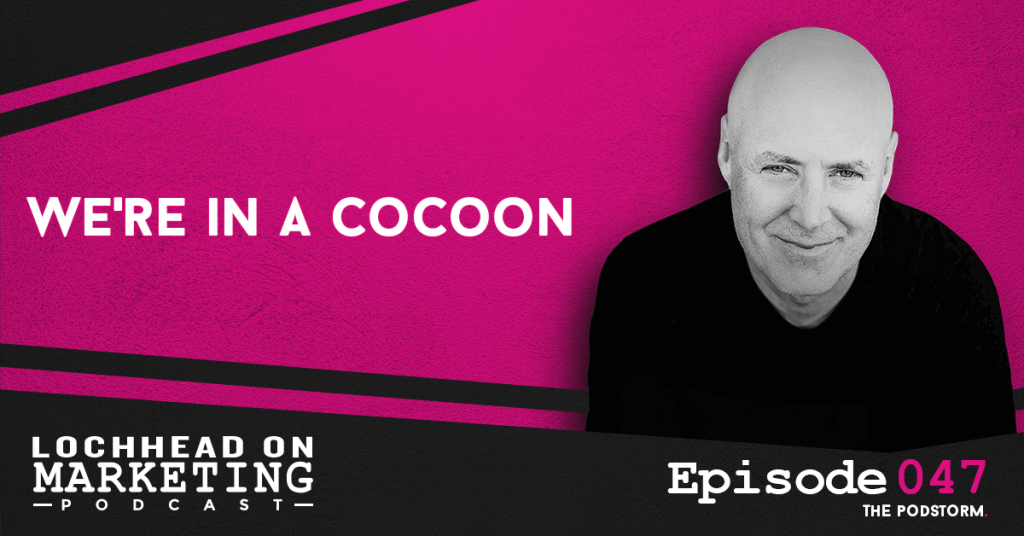
Podcast (lochheadonmarketing): Play in new window | Download (Duration: 9:04 — 6.2MB) | Embed
Subscribe: Apple Podcasts | Spotify | RSS | More
It appears that we are in a great time of transition. There is that “before February” and then there is “whatever comes after Coronavirus.” The present moment seems like we’re in a cocoon. We are at a cocoon time — an incredible in-between zone — where, in business sense, there is a good chance to have massive winners and horrible losers.
Let’s talk about the mindset required to become one of those massive winners.
There’s No “Going Back”
We hear a lot of talk in the media, about opening back the economy and “going back to work.” Christopher strongly believes there is no “going back” to whatever we had, pre-coronavirus. We are currently live in a cocoon and we are facing a lot of changes in terms of how we do work
“I think what’s going on here is that almost every part of the way that we live, play and work has the potential, the strong potential to be materially different as result of C-19. I think there are megatrends that were going on anyway that are being materially accelerated,” – Christopher Lochhead
The most obvious change is a distance working or working from home. Another industry facing a massive change in the food industry and the supply chain.
What’s Likely To Be Different?
Christopher encourages you to think about every major component of your work and personal life and consider, what is likely to be different.
“You see, there are two headsets out there. There’s a strategic mindset of people who say ‘well I’m going to bet on the world, being the same’ and ‘look, maybe somethings are the same.’ Then, there’s another headset that says, ‘we think the world is going to be different.” – Christopher Lochhead
Christopher believes there is an acceleration of different niches, which he also calls a Nichenado, an explosion of new innovation, of new categories of new niches.
What About Those Differences?
Christopher challenges you to ask yourself what you can do to ensure you can design and dominate your market category in the future. He further shares the concept of “backcasting” (as opposed to forecasting) which is a concept of Mike Maples of FloodGate Capital. You can listen to him on Follow Your Different Episode 163.
“What were the opportunities? What were the problems created or accelerated by C-19 and how can we be a part of solving them? Most importantly, how do you create the future of your choosing?” – Christopher Lochhead
To know more about why we live in a cocoon and how we can create the future of our choosing, download, and listen to this episode.
Bio:
Christopher Lochhead is a #1 Apple podcaster and #1 Amazon bestselling co-author of books: Niche Down and Play Bigger.
He has been an advisor to over 50 venture-backed startups; a former three-time Silicon Valley public company CMO and an entrepreneur.
Furthermore, he has been called “one of the best minds in marketing” by The Marketing Journal, a “Human Exclamation Point” by Fast Company, a “quasar” by NBA legend Bill Walton and “off-putting to some” by The Economist.
In addition, he served as a chief marketing officer of software juggernaut Mercury Interactive. Hewlett-Packard acquired the company in 2006, for $4.5 billion.
He also co-founded the marketing consulting firm LOCHHEAD; was the founding CMO of Internet consulting firm Scient, and served as head of marketing at the CRM software firm Vantive.
We hope you enjoyed this episode of Lochhead on Marketing™! Christopher loves hearing from his listeners. Feel free to email him, connect on Facebook, Twitter, Instagram, and subscribe on iTunes! You may also subscribe to his newsletter, The Difference, for some amazing content.
045 Questions and Cocktails: Facebook Live Q & A (Part 2) | Marketing PodStorm #7
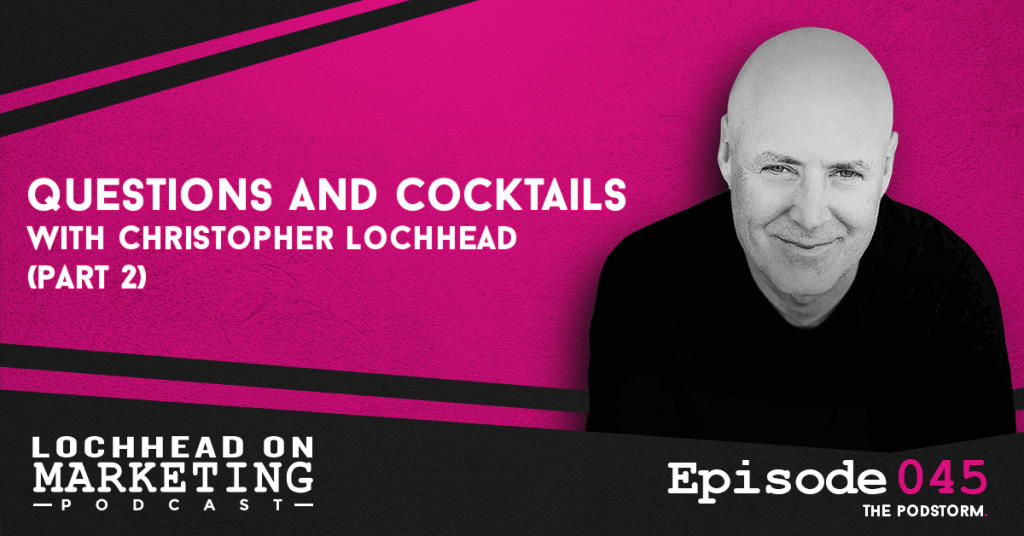
Podcast (lochheadonmarketing): Play in new window | Download (Duration: 21:45 — 14.9MB) | Embed
Subscribe: Apple Podcasts | Spotify | RSS | More
During the PodStorm, were doing a live Facebook Question and Answer session, every Friday, 11:30 a.m. PST. Here is the second part of our recording, for Q&A about marketing and category design. We talk about all things ranging from new category creation, how to craft problems positively, and creating demand during a crisis.
How to know if you have a new category?
As counterintuitive as it might sound, now is a great time to launch a new category. Christopher encourages you to ask yourself a couple of key questions: number 1, “what problem do I solve?” or “do I solve that in a different or unique way?” and “What kind of market insights do you have?” If you don’t think of it as a problem, maybe you create an opportunity.
“Nobody buys a solution unless they see a problem. You might consider asking what kind of insights do you have. One is technical insight. Somebody creates a new algorithm or somebody creates hardware. Another one is Market Insight, for example, ‘I want to be able to hire somebody to do an odd job, takes something from point a to point b, come over and help me with something.’ Do you have a technical insight or do you have a market insight? Regardless of what it is, begin to evangelize that insight, that difference.” – Christopher Lochhead
How do you talk about problems in a positive way?
Evangelizing a problem in a positive way can lead to mass differentiation and category creation. Christopher advises legendary marketers to frame the problem as deeply relatable. This way, we want to be seen as a hero, mobilizing people to come together to solve said problem.
“Here’s what I’ve learned, what you want to do in the way you talk about problems is, do it such that you create ‘us.’ You make the problem an enemy, a ‘them.’ You want to define the problem very powerfully, in a way that resonates with people, and then you say, this aggression will not stand, man.” – Christopher Lochhead
How do you create demand in a situation where your revenue is dropping?
Christopher chides that this is one tough question. We know many companies are having this problem. He drops a bunch of ideas that although might not exactly answer this question, but hopefully might stimulate some thinking.
“The first idea, take a handful of your smartest people and lock them and brainstorm 3-5 things that you go near term to stimulate revenue. If you are in the B2B space, create a white space analysis. What you do, you take your existing customer base, do a quick analysis to find out which of your products and services they are currently using. Once you know what they are using, then you immediately target existing customers. If you’re in the B2C, be visible in your neighborhood.” – Christopher Lochhead
To hear more about the Facebook live Q&A session (Part 2) with Christopher Lochhead, download and listen to this episode.
Bio:
Christopher Lochhead is a #1 Apple podcaster and #1 Amazon bestselling co-author of books: Niche Down and Play Bigger.
He has been an advisor to over 50 venture-backed startups; a former three-time Silicon Valley public company CMO and an entrepreneur.
Furthermore, he has been called “one of the best minds in marketing” by The Marketing Journal, a “Human Exclamation Point” by Fast Company, a “quasar” by NBA legend Bill Walton and “off-putting to some” by The Economist.
In addition, he served as a chief marketing officer of software juggernaut Mercury Interactive. Hewlett-Packard acquired the company in 2006, for $4.5 billion.
He also co-founded the marketing consulting firm LOCHHEAD; was the founding CMO of Internet consulting firm Scient, and served as head of marketing at the CRM software firm Vantive.
We hope you enjoyed this episode of Lochhead on Marketing™! Christopher loves hearing from his listeners. Feel free to email him, connect on Facebook, Twitter, Instagram and subscribe on iTunes! You may also subscribe to his newsletter, The Difference, for some amazing content.
044 Questions and Cocktails: Facebook Live Q & A (Part 1) | Marketing PodStorm #6
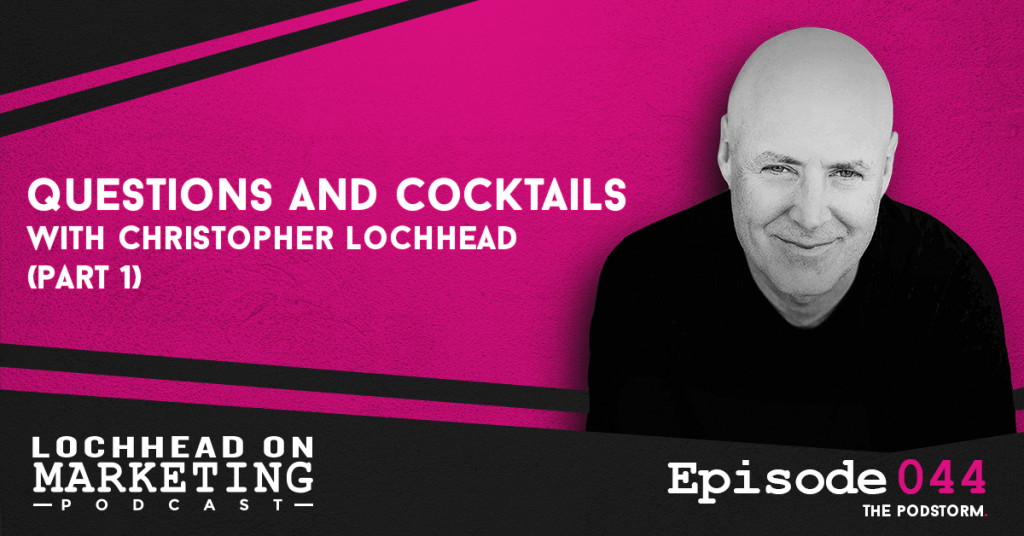
Podcast (lochheadonmarketing): Play in new window | Download (Duration: 17:37 — 12.1MB) | Embed
Subscribe: Apple Podcasts | Spotify | RSS | More
During the PodStorm, were doing a live Facebook Question and Answer session, every Friday, 11:30 a.m. PST. We did our first one, we’re going to share it with you in two parts. We talk about CEOs who don’t get marketing, the relationship between CMOs and CEOs during times of crisis, and more about evangelizing the brand.
What do I do if my CEO doesn’t get it about marketing?
Christopher shares that very little happens without legendary marketing. He stresses the difference of working on something exponential versus something that is incremental. In marketing terms, the more exponential it is, the more explanation it requires. In that situation, that’s called legendary marketing or category design.
“If your CEO, doesn’t get it, QUIT. If your CEO doesn’t get it about marketing and isn’t willing to be a leader, isn’t willing to get out in front and be the company designing and dominating the category and if you cant get your CEO there pretty quickly, its time to get out and go.” – Christopher Lochhead
What relationship should a CMO and a CEO have, particularly during a recession?
Christopher says that CMO is like the Press Secretary for the President of the United States. He shares quite a few examples, being three times CMO himself who sat in that position during a crisis.
“Strategic communication frames the context for everything that is going on in a company. If the CEO and CMO aren’t working in lockstep, then framing that strategic context is not going to work very well.” – Christopher Lochhead
Tell me more about evangelizing the category
Most companies have overrotated on brand. The marketing world have oftentimes marketed their brands and not necessarily their categories. He points out that in times like this, companies do not just fight over market share, they fight over a minimizing wallet share.
“Look, I’m a 3x CMO, I think branding is important. However, categories are about customers. When we talk all the time about brands, it is equivalent to a dinner party and talking all about yourself, as opposed to talking about others. Categories, fundamentally are about problems, or opportunities, being experienced by others. That is point A. Point B: with categories, it is the way the human brain works. We first understand the category is, then we start thinking about brands. Hierarchy. Our brain works on, category, subcategory and then brand. For example, drink, whiskey, brand. In other words, if I’m not interested in the category, then I’m not going to be interested in the brand.” – Christopher Lochhead
To hear more about the Facebook live Q&A session (Part 1) with Christopher Lochhead, download and listen to this episode.
Bio:
Christopher Lochhead is a #1 Apple podcaster and #1 Amazon bestselling co-author of books: Niche Down and Play Bigger.
He has been an advisor to over 50 venture-backed startups; a former three-time Silicon Valley public company CMO and an entrepreneur.
Furthermore, he has been called “one of the best minds in marketing” by The Marketing Journal, a “Human Exclamation Point” by Fast Company, a “quasar” by NBA legend Bill Walton and “off-putting to some” by The Economist.
In addition, he served as a chief marketing officer of software juggernaut Mercury Interactive. Hewlett-Packard acquired the company in 2006, for $4.5 billion.
He also co-founded the marketing consulting firm LOCHHEAD; was the founding CMO of Internet consulting firm Scient, and served as head of marketing at the CRM software firm Vantive.
We hope you enjoyed this episode of Lochhead on Marketing™! Christopher loves hearing from his listeners. Feel free to email him, connect on Facebook, Twitter, Instagram and subscribe on iTunes! You may also subscribe to his newsletter, The Difference, for some amazing content.

